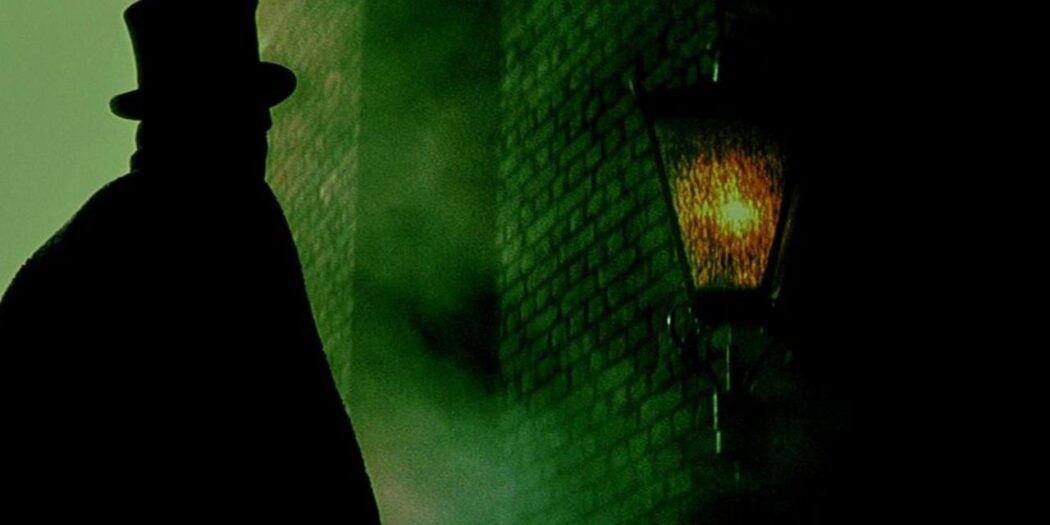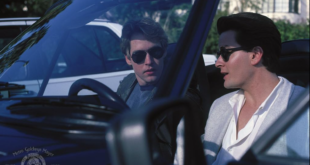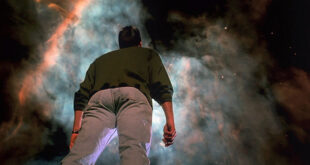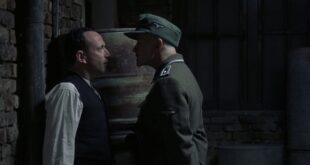Unsung Cinema
My favorite thing to do is recommend movies I feel have been underlooked or undervalued over the years. Raising awareness of these movies and also receiving an understanding of underrated gems I haven’t seen is what connects cinema lovers. It’s a good feeling if someone likes your recommendation and thanks you. Almost as if you made the film yourself. This is part of why I’d like to bring back an old series of blogs I did in the day called Unsung Cinema. Nowadays, we have more access to older movies than ever with streaming (though it still seems like sometimes you can’t find the one you want to watch), so I need to point out where to access these films to manage.
From Hell
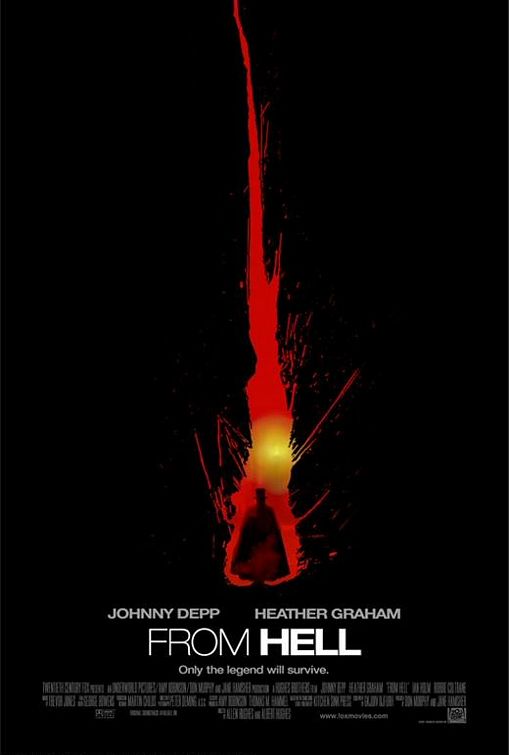
Available on: HBO Max and Hulu with a subscription.
From Hell is an adaptation of Alan Moore’s genuinely excellent source material and admittedly not a very good adaptation of it in terms of fidelity. Many changes are made in the film, including turning the story into a whodunit. Throughout the graphic novel, we know it is Sir William Gull, and he is the main character. Here there’s a switch to making Inspector Abberline the main protagonist and turning him more into a Sherlock Holmes-type dandy who uses opium, laudanum, and absinthe to help him figure out his cases. This is often held against the film, and Alan Moore famously hated it as he has hated all his film adaptations. However, From Hell has many positive and interesting qualities (2001). It’s a dark gothic historical thriller about sexual hypocrisy.
Johnny Depp plays Inspector Abberline, and initially, he turned down the role due to the similarity of playing an inspector already in another atmospheric thriller Sleepy Hollow two years earlier. Abberline, in the film, has a reputation for having wild theories that turn out to be correct. The film follows the murders of “The Canonical Five” Mary Ann Nichols, Annie Chapman, Elizabeth Stride, Catherine Eddowes, and Mary Kelly. As Abberline investigates further, he discovers a far bigger conspiracy at hand, one that goes all the way to Queen Victoria. The graphic novel and film borrow from Steven Knight’s theory that the Jack the Ripper murders were part of a conspiracy to conceal the birth of an illegitimate royal baby fathered by Prince Albert Victor, Duke of Clarence. In the film, all the victims know each other, and their friend Ann Crook has been married to Prince Albert secretly. This theory is no longer taken seriously by most Ripperologists, but it allows the Hughes Brothers to explore themes of class and privilege in Victorian society.
From Hell, at its very heart, is not really about the murders. It’s about brutality and misogyny toward women. However, great care is taken to recreate the murders themselves, but more about how in Victorian society and today, institutions still exist to protect the privileged and wealthy while discarding the welfare of women and those from the lower classes. Working women prostitutes are treated as objects that can easily be discarded. If they’re killed, does it even matter? That’s the view many in the privileged classes had at the time. Those who know the truth about those in power are silenced or altogether eliminated. The real villains in the film are the elites who inhabit secret societies like the Freemasons, who meet secretly underground in lavishly splendid scenes to control and set in motion what is happening to these prostitutes.
What they said about it at the time.
From Hell was released during a difficult time for movies a little over a month after 9/11 in October 2001. It was marketed as a thrill-a-minute murder mystery with gory scenes and suspense at every turn. It did modestly well at the box office, finishing number 1 opening weekend but was not a massive hit with audiences. Reviews were mixed, with the film earning 57% on Rotten Tomatoes and a not much better 66% audience score. The consensus reads: “Visually impressive, but this latest Ripper tale is dull and far from scary.” It did receive some notable positive remarks, including a Two Thumbs Up from Ebert & Roeper. However, it was criticized by many reviewers for its pacing, the casting of Heather Graham, and the changes made to history and the graphic novel.
A Rebuttal to Those Criticisms and The Case for From Hell
I’m not here to argue that From Hell is an entirely flawless masterpiece, but the film has some unique things going for it that outshine the flaws. To merely side mention that the film is visually impressive is to undersell how visually spectacular this film is to watch tremendously. The very first scene shows Abberline smoking opium, and from there, we are sent on a kind of drug-fueled vision of London in 1888 with a breathtaking sequence beginning on the red skyline of London. The camera pans down to the inner dwellings and alleyways of Whitechapel London, where we meet Mary Kelly for the first time. The visual motif of panning down to the underground is followed several times throughout the film suggesting a society with secrets that go ignored. It sets the tone for the whole movie. The gaslit foggy streets and cobblestone world create one Hell of an atmospheric film.
The murder sequences are filmed stylishly and brutally as well. Each successive murder becomes more and more gruesome. Another highlight is how Abberline’s drug-induced visions are filmed very vividly, and the film takes on the idea of a mad fairy tale. The technique is like a cross between MTV, Oliver Stone, and David Fincher. From Hell was shot by Peter Deming, no stranger to an atmosphere, having worked with David Lynch in the past. In 2001 alone, he had From Hell and Mulholland Drive on his credits. Sadly he was not nominated for an Oscar for either.
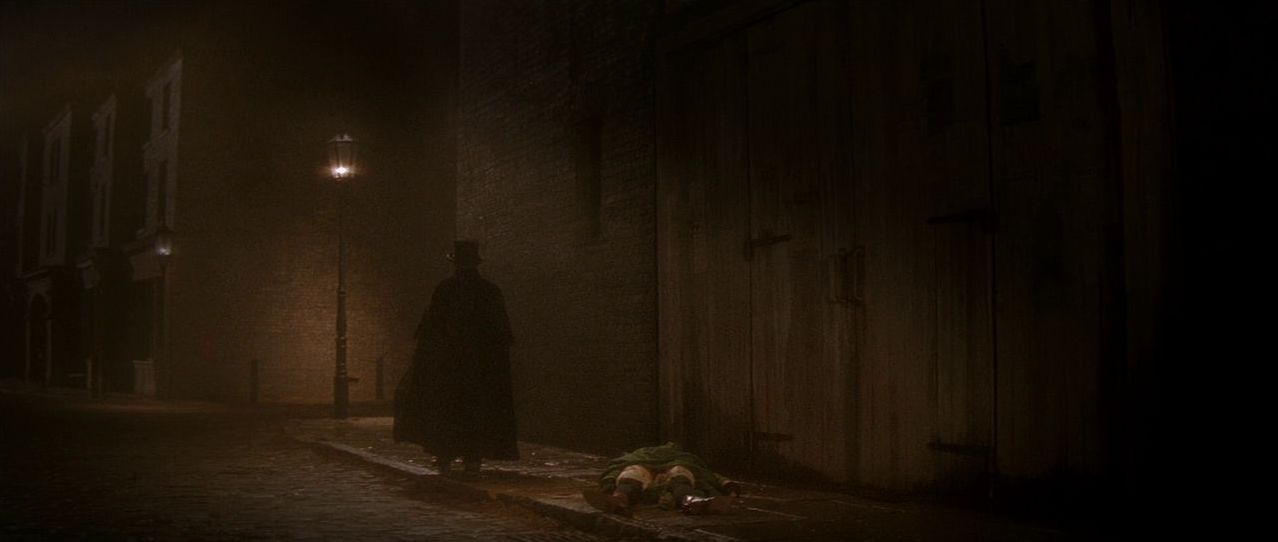
Regarding how historically accurate the film is, it only pertains to the look of the time. The film features characters who are real people, but they are all fictionalized and fit the purpose of the story. We will probably never know the actual Jack the Ripper was. This film makes no pretense of offering accuracy that way. It gives us an idea of what it was like in 1888 London and how fear and paranoia gripped the city. The Hughes Brothers seem to have grander ambitions than simply offering a historically accurate police procedural. I also like how the film hammers home that prostitutes are not even considered human beings. The film presents them as human, though, and the violence towards women is brutal. There’s also this fascination the film has with the flawed science of the time, including lobotomy and treatments for mental illness.
From Hell is a film I continually revisited when I was a kid. I always enjoyed the visuals and the total immersion in the world the film creates. It’s flawed, but those flaws are because the full vision of the Hughes Brothers was not allowed, and plenty of character development moments were cut from the film. 20th Century Fox was more interested in making it look like a jump scare movie aimed at teens of the time, not the deeper themes of class, science, and brutality towards women and the poor. The twists and whodunit aspects have never been fascinating to me. You might howl when it’s revealed who the killer is, but that is merely window dressing for the themes probed. For the Hughes Brothers, it was a continuation of the examination of street violence, like in Menace II Society or the social pieces of Dead Presidents. The result is haunting, atmospheric, and unforgettable.
 Movie Finatics The Place for Movie Lovers
Movie Finatics The Place for Movie Lovers
